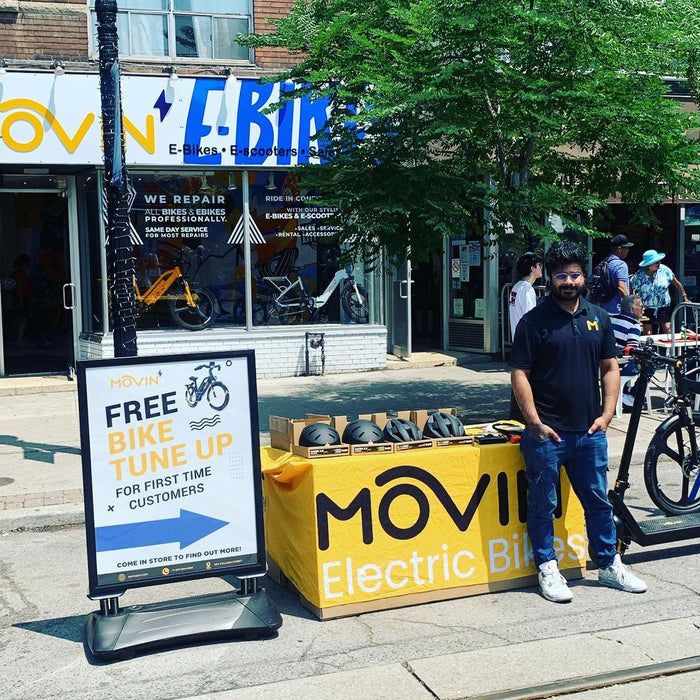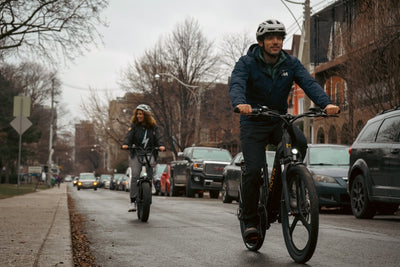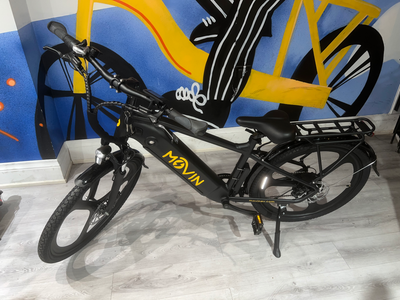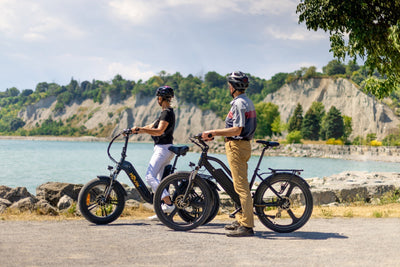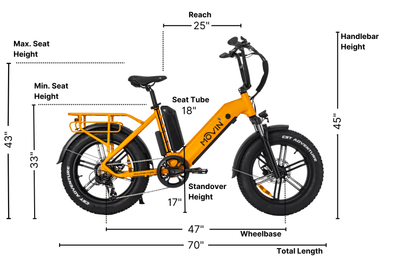In recent years, there has been a significant increase in the popularity of e-bikes, giving rise to a new era of urban transportation. As more people recognize the benefits of using e-bikes for their daily commute, the demand for these electric-powered bicycles has skyrocketed. To cater to this growing demand, Toronto has seen the emergence of several ebike stores. However, not all stores are created equal, and finding the best ebike store that offers a wide variety of e-bikes, excellent customer service, and reliable maintenance and repair services can be a daunting task. In this article, we will explore the characteristics of the best ebike store in Toronto and guide you through the process of choosing the right e-bike for your needs..
Where to buy your first ebike
Acquiring an electric bike (e-bike) can be done through various channels, each offering different advantages. Here's a list of ways and places where you can get your e-bike:
1) Local Bike Shops:
Visiting a local bike shop is one of the best ways to purchase an e-bike. You get the advantage of seeing the bikes in person, trying them out, and getting professional advice. Bike shops also offer after-sales services and repairs.
Pros:
-
Test Rides Available: You can test different e-bikes to find the one that feels right for you in terms of comfort, size, and performance.
-
Expert Advice: Staff at local ebike stores are usually knowledgeable and can offer valuable advice on selecting the right e-bike based on your needs and preferences.
-
Immediate Assistance: If there are any issues with the e-bike, you can easily return to ebike store for help, repairs, or servicing.
-
No Assembly Required: E-bikes from local stores are typically assembled and adjusted by professionals, saving you the hassle of doing it yourself.
-
Support Local Business: Purchasing from a local ebike store supports the local economy and can build community relationships.
-
After-Sales Services: Many local bike shops offer free or discounted maintenance services for a certain period after purchase.
Cons:
-
Higher Prices: Local ebike stores might have higher prices compared to online retailers due to overhead costs like rent and staffing.
-
Limited Selection: They may have a limited range of e-bike models and brands compared to online ebike stores or larger retail chains.
-
Convenience: Depending on your location, you might need to travel to visit the ebike store, unlike online shopping which you can do from home.
-
Sales Pressure: In some cases, there might be a sales pressure to make a purchase, which can be uncomfortable for some buyers.
-
Operating Hours: Local stores have specific operating hours, which might not always align with your schedule, unlike online stores which are accessible 24/7.
2) Online Retailers:
Pros:
-
Wider Selection: Online retailers often have a broader range of e-bike models and brands, offering more choices in terms of features, styles, and price points.
-
Competitive Pricing: Online ebike stores typically have lower overhead costs than physical stores, which can translate into lower prices and better deals for customers.
-
Convenience: Shopping online is convenient as you can browse, compare, and order from the comfort of your home at any time.
-
Customer Reviews: Online platforms usually have customer reviews and ratings, providing valuable insights from other users' experiences.
-
Easy Comparison: It's easier to compare different models and prices across various online ebike stores to find the best deal.
-
Direct-to-Customer Models: Some e-bike brands sell directly to customers online, which can mean lower prices and direct customer support from the manufacturer.
Cons:
-
No Test Rides: You can't test ride the bike before purchasing, so you won't know how it feels or fits until it arrives.
-
Assembly Required: E-bikes bought online often come partially assembled, and you might need to complete the assembly yourself or pay for professional assembly.
-
Difficulties with Returns: Returning a bulky item like an e-bike can be more complicated and expensive compared to returning smaller items.
-
Limited Personal Advice: Unlike in a physical ebike store, getting expert advice or answers to specific questions can be more challenging.
-
Potential for Shipping Damage: There's a risk of damage during shipping, and resolving these issues can be a hassle.
-
After-Sales Service: Servicing and repairs might be more challenging, as you won’t have a direct relationship with a local ebike store for ongoing maintenance and support.
-
Warranty Issues: Dealing with warranty claims might be more complicated, as you'll need to coordinate with the online retailer or manufacturer.
3) Direct from Manufacturers:
Pros:
-
Lower Prices: Without middlemen or retailers in the supply chain, manufacturers often offer lower prices, as there are fewer overhead costs to pass on to the consumer.
-
Latest Models: Buying ebike directly from the manufacturer ensures access to the latest models and newest technologies, sometimes before they are available in ebike stores.
-
Direct Customer Support: Customer service is usually provided directly by the manufacturer, which can mean more knowledgeable and comprehensive support.
-
Customization Options: Some manufacturers offer customization options for your e-bike, allowing you to select components, colors, or accessories.
-
Warranty Direct from Manufacturer: Any warranty claims are handled directly with the manufacturer, which can simplify the process.
-
Brand Assurance: Buying ebike directly can give you assurance that you are getting a genuine product, not a counterfeit or knock-off.
Cons:
-
No Physical Inspection or Test Ride: Similar to online purchases, you can't see, feel, or test ride the ebike before buying.
-
Potential Assembly Required: The bike may be shipped partially assembled, and you might need to complete the assembly or take it to a local shop for professional assembly.
-
Shipping Costs: Depending on the manufacturer’s policies, you might have to pay for shipping, which can be costly for large items like e-bikes.
-
Limited Face-to-Face Interaction: Some buyers appreciate the personal interaction and advice they can get from a physical ebike store, which is absent when buying ebike directly from the manufacturer.
-
Return and Service Logistics: Handling returns or servicing can be more complicated without a local store. You might need to ship the bike back to the manufacturer for returns or warranty service.
-
Less Opportunity for Price Comparison: When buying ebike directly, it's harder to compare prices across different retailers to ensure you're getting the best deal.
4) Department and Sporting Goods Stores:
Pros:
-
Physical Inspection: You have the opportunity to see, touch, and possibly test ride the e-bike before making a purchase.
-
Immediate Purchase: Unlike online shopping, you can take the e-bike home immediately after purchasing.
-
Ease of Returns: If you encounter any issues, returning the e-bike is generally straightforward, as you can take it back to the store.
-
Some Level of Variety: These stores often carry a selection of different e-bike brands and models, though the range might be more limited than specialized bike shops.
-
Additional Services: Some department and sporting goods stores offer assembly, maintenance, and repair services.
-
Regular Sales and Promotions: You might find good deals during sales events or use store loyalty programs for discounts.
Cons:
-
Limited Expertise: The staff may not have specialized knowledge about e-bikes, which can be a drawback if you need expert advice.
-
Limited Selection: The range of e-bikes might be limited compared to specialized e-bike stores or online retailers, particularly in terms of high-end or specialized models.
-
Potentially Higher Prices: Prices at department and sporting goods stores can sometimes be higher compared to direct-from-manufacturer or online purchases.
-
Pre-Assembled Bikes: E-bikes might come pre-assembled, and the quality of assembly can vary, possibly requiring adjustments or reassembly.
-
After-Sales Support: The level of after-sales support, such as servicing and parts availability, may not be as comprehensive as specialized bike shops.
-
Focus on Entry-Level Models: Often, these stores focus more on entry-level or mid-range models, which might not meet the needs of more serious or experienced riders.
5) Second-Hand Marketplaces:
Pros:
-
Cost Savings: One of the biggest advantages of buying second-hand ebike is the potential for significant cost savings. E-bikes can be expensive, and buying used ebike can make them more affordable.
-
Eco-Friendly Option: Purchasing a second-hand e-bike is a form of recycling, which is beneficial for the environment. It extends the life of the bike and reduces waste.
-
Access to Higher-End Models: Sometimes, you can find high-quality or higher-end e-bikes being sold for a fraction of their original price.
-
Rapid Depreciation of E-Bikes: E-bikes, like many electronic items, can depreciate quickly. Buying second-hand ebike means you avoid the initial depreciation hit.
-
Quick Availability: Unlike ordering a new e-bike, which may have wait times, buying second-hand ebike means you can often acquire the bike immediately.
Cons:
-
Unknown History and Wear: The main drawback is the uncertainty about the bike’s history. You might not know how well the previous owner maintained the bike, especially the battery and motor.
-
No Warranty: Second-hand e-bikes typically don’t come with a manufacturer warranty, which means you bear the risk of any repairs or replacements.
-
Potential for Scams: There is always a risk of scams or buying stolen property, especially when dealing with private sellers on online marketplaces.
-
Battery Lifespan Concerns: The battery is a crucial component of an e-bike and can be expensive to replace. Batteries degrade over time and with use, and it can be difficult to assess the battery's health in a second-hand e-bike.
-
Cost of Potential Upgrades or Repairs: While the initial cost may be lower, you might end up spending more on repairs or upgrades.
-
No After-Sales Service: Unlike buying ebike from a store, you won’t get any after-sales services or support.
6) Crowdfunding Platforms:
Pros:
-
Early Access to Innovation: Crowdfunding platforms often feature cutting-edge e-bike designs and technologies before they hit the mainstream market.
-
Discounted Pricing: Products on crowdfunding platforms are typically offered at a lower price than their eventual retail value as a reward for early backers.
-
Supporting Creativity and Innovation: By backing a crowdfunding campaign, you're directly supporting inventors and small businesses in bringing their innovative ideas to life.
-
Community Engagement: Backers often get to be part of a community, receiving regular updates on the product development process and providing feedback.
-
Exclusive Features or Models: Some crowdfunding campaigns offer exclusive versions or features of the e-bike that may not be available later in the retail version.
Cons:
-
Risk of Delays: Crowdfunding projects often face delays in production and delivery. The time frame from backing a project to receiving your e-bike can be uncertain and longer than expected.
-
Risk of Non-Delivery: There's always a risk that the project might not come to fruition due to various challenges, and you might never receive the e-bike or get your money back.
-
Limited Recourse: If the product doesn't meet your expectations, or if there are issues, you have limited recourse compared to buying ebike from an established retailer.
-
Pre-Production Models: The product you back is often a prototype, and the final product might have changes or improvements, which can be a pro or a con depending on your perspective.
-
Unknown Final Quality: Until the e-bike is produced and reviews come out, there's uncertainty about the final quality and performance of the bike.
-
Lack of Warranty and Support: Crowdfunded e-bikes may not come with the same level of warranty, customer support, or after-sales service as those bought from traditional retailers or directly from manufacturers.
7) E-Bike Expos and Shows:
Pros:
-
Wide Range of Options: E-bike expos and shows often feature a broad array of brands and models under one roof, giving you the chance to explore numerous options.
-
Test Rides: Many expos and shows offer the opportunity for test rides, allowing you to get a feel for different e-bikes and find the one that suits you best.
-
Expert Advice and Information: These events are usually staffed by knowledgeable representatives who can provide detailed information and answer your questions about the e-bikes.
-
Show Discounts and Deals: Exhibitors often offer special show pricing or promotions, which can result in cost savings compared to regular retail prices.
-
Latest Trends and Technologies: Expos and shows are places where manufacturers showcase their latest models and innovations, giving you a glimpse into the newest trends and tech in the e-bike industry.
-
Community Experience: These events allow you to meet and interact with fellow e-bike enthusiasts, sharing experiences and advice.
Cons:
-
Overwhelming Choices: The sheer variety of options can be overwhelming, making it difficult to decide, especially for first-time buyers.
-
Impulse Buying: The expo environment, with its array of options and potential deals, might lead to impulse buying ebike without thorough research.
-
Limited Time to Decide: The pressure of limited-time show deals can lead to rushed decisions without the usual due diligence.
-
Potential for Extra Costs: While you might get a good deal on the e-bike itself, there could be additional costs for accessories, upgrades, or shipping.
-
Warranty and Service Concerns: Make sure to clarify warranty and service details, as purchasing from an expo might differ from buying from a local store or directly from a manufacturer.
-
Travel and Entry Costs: Attending an expo or show may involve travel and entry costs, which should be considered as part of the overall expense.
When choosing where to buy your e-bike, consider factors like your budget, the type of e-bike you want, after-sales service and support, and the opportunity to test ride before purchasing. If you're new to e-bikes, purchasing from a local bike shop or a specialty e-bike store might provide valuable guidance and service.

How to choose the right ebike when buying
Choosing the right e-bike involves considering several factors to ensure it meets your needs and preferences. Here's a guide to help you make an informed decision:
-
Determine Your Needs: Assess what you will primarily use the e-bike for – commuting, off-road adventures, leisure rides, cargo hauling, etc. Your intended use will significantly influence the type of e-bike that's best for you.
-
Type of E-Bike: Based on your needs, decide on the type of e-bike:
- Commuter e-bikes are great for urban environments.
- Mountain e-bikes are designed for off-road trails.
- Cargo e-bikes have extra capacity for carrying goods.
- Folding e-bikes offer portability and easy storage.
-
Motor Type: Choose between a hub motor and a mid-drive motor. Mid-drive motors are generally better for hilly terrains and offer a more natural riding experience, while hub motors are typically quieter and more straightforward.
-
Battery Capacity: Consider the range you need. A larger battery provides a longer range but increases the weight and cost. Think about your typical ride length and the availability of charging points.
-
Power and Speed: Check the motor’s power output, usually measured in watts. Ensure it meets local regulations and is suitable for your riding terrain and style.
-
Frame Size and Geometry: Make sure the bike fits your body. Test different frame sizes and styles to see what feels comfortable.
-
Suspension: Depending on the terrain, decide if you need a full-suspension bike for comfort and control or if a hardtail or no suspension will suffice.
-
Brakes: Look for reliable brakes, such as hydraulic disc brakes, for better control and safety, especially important for heavier e-bikes.
-
Gearing System: Consider the type of gearing system. A larger number of gears is beneficial for varied terrains.
-
Price and Budget: Set a realistic budget. Keep in mind that higher-priced e-bikes often offer better quality, longer lifespan, and more reliable components.
-
Test Ride: If possible, test ride several models. This is the best way to gauge the comfort, performance, and suitability of the e-bike.
-
Warranty and Service: Check the warranty provided and consider the manufacturer's reputation. Also, think about the availability of after-sales service and parts.
-
Reviews and Recommendations: Read reviews and seek recommendations from current e-bike owners. Online forums and community groups can be valuable resources.
Remember, the best e-bike for you is the one that fits your specific needs, feels comfortable to ride, and falls within your budget. Take your time to research and test different models before making a decision.
Movin Ebikes Store
Among the various e-bike stores in Toronto, one stands out for enthusiasts and first-time buyers alike.
Overview of the Store
Movin’ Mobility is a haven for e-bike enthusiasts, boasting an impressive collection of e-bikes from renowned manufacturers. From sleek urban models to robust off-road e-bikes, this store caters to all types of riders. With its spacious showroom and friendly staff, visitors can explore a wide range of e-bikes and receive expert advice tailored to their individual needs.
Unique Selling Points
What sets this store apart from others in Toronto is its commitment to delivering a premium customer experience. The store goes beyond the sale, offering comprehensive maintenance and repair services. Their team of certified technicians ensures that each e-bike is assembled and fine-tuned to the highest standards before being delivered to the customer. The store also offers test rides, allowing customers to experience the performance and comfort of different e-bike models before making a purchase.
In conclusion, the best e-bike store in Toronto offers a diverse selection of e-bikes, outstanding customer service, and reliable maintenance and repair services. When choosing an e-bike, consider your specific needs, intended use, and desired features. E-bikes are revolutionizing urban transportation, providing an eco-friendly and efficient way to navigate the city. As technology continues to evolve, the future of e-bikes in Toronto looks promising, with advancements in e-bike technology and increased awareness of their benefits in sustainable urban living. So, explore the best e-bike store in Toronto and embrace the e-bike revolution for a greener and more enjoyable commute.
Come in our store - 654 College street Toronto, and we will show you why our Ebike one of the best in the market.
